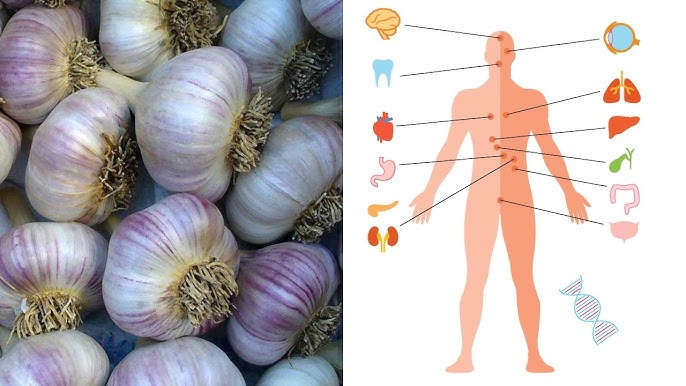
While garlic is widely celebrated for its health benefits, including boosting immunity, reducing inflammation, and lowering cholesterol, it’s important to understand that consuming garlic in excessive amounts can have some downsides. Though it’s safe for most people when eaten in moderation, eating too much garlic or using it incorrectly can lead to several unpleasant side effects.
1. Digestive Issues
Garlic can be harsh on the digestive system when consumed in large amounts. Some people may experience gas, bloating, or heartburn, especially if they have a sensitive stomach or consume raw garlic. Eating too much garlic can irritate the stomach lining, leading to discomfort or even nausea.
2. Bad Breath and Body Odor
One of the most well-known side effects of garlic is its ability to cause bad breath, also known as garlic breath. The sulfur compounds in garlic, which are responsible for many of its health benefits, can linger in the mouth and be released through your pores, leading to a strong body odor. For some, this effect can last even after brushing and rinsing the mouth.
3. Allergic Reactions
Garlic can cause allergic reactions in some individuals. These reactions may manifest as skin rashes, hives, or even digestive issues like diarrhea and nausea. If you experience any signs of an allergy after eating garlic, it’s essential to stop consuming it and consult with a healthcare professional.
4. Blood Thinning
Garlic has natural blood-thinning properties, which can be beneficial for cardiovascular health. However, if you consume too much garlic, particularly in supplement form, it can increase the risk of excessive bleeding. This is especially important for people who are taking blood-thinning medications like aspirin or warfarin. Garlic can enhance the effects of these medications, leading to an increased risk of bleeding or bruising.
5. Interference with Medications
Garlic, particularly in supplement form, can interfere with certain medications. For example, it may interact with anticoagulants (blood thinners), antiplatelet drugs, and some types of birth control pills. If you’re on medication, it’s best to consult with a doctor before consuming large amounts of garlic.
6. Low Blood Pressure
Garlic is known for its ability to lower blood pressure naturally. However, for people who already have low blood pressure, eating too much garlic can cause dizziness, lightheadedness, or even fainting due to a further drop in blood pressure levels.
7. Potential for Skin Burns
Applying raw garlic directly to the skin, especially for long periods, can lead to burns or irritation. This happens because garlic contains sulfur compounds that can be too strong for the skin when undiluted. If you use garlic topically, always mix it with a carrier oil or dilute it to avoid skin damage.
Final Thoughts
While garlic offers numerous health benefits, it’s essential to consume it in moderation and be aware of the potential dangers. If you experience any adverse reactions, it’s wise to reduce your garlic intake and consult with a healthcare professional. For those taking medications or with preexisting conditions, speaking with a doctor before increasing garlic consumption is a good idea to avoid complications.
